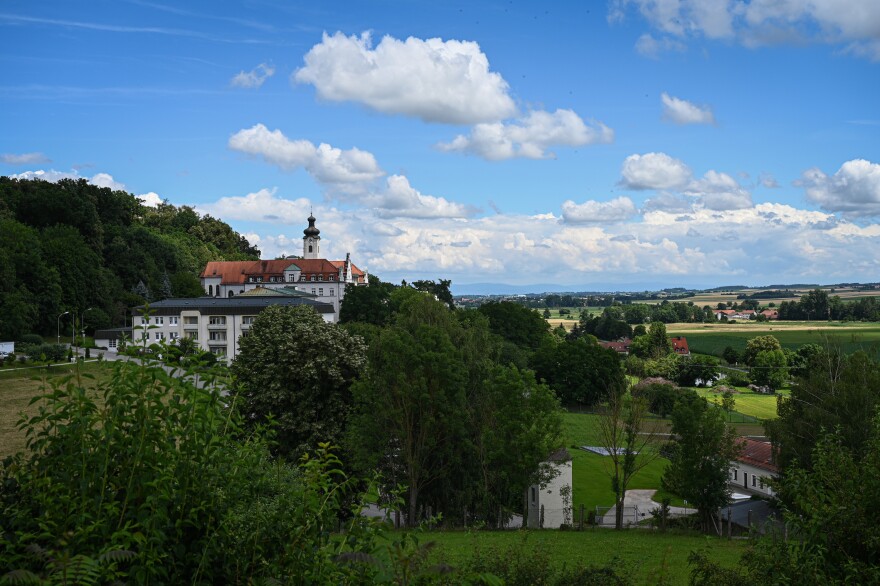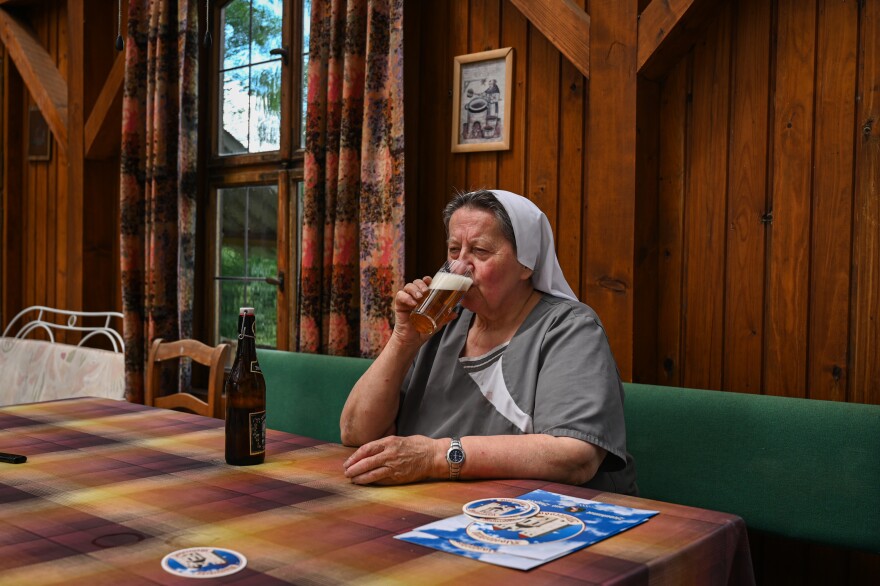MALLERSDORF, Germany — The village church bells chime 11 in the morning and Hermann Zausinger has decided he needs more beer. He's a farmer, and by midday, he has worked up a thirst.
"My farm has vegetables, a fish pond, a herd of sheep," he says. "I grow everything for myself, except for beer."
He's just emerged from his village brewery and he plops four crates — 80 bottles — into the trunk of his car, smiles, and proclaims an oft-repeated phrase from these parts. "Beer is Bavarian bread."

It seems that every town in the southern German state of Bavaria — no matter how small — has a brewery, and beer is brewed by all sorts of people. And before you judge farmer Zausinger for his morning beer run, consider who he bought it from: Sister Doris Engelhard, a 72-year-old Franciscan nun. She claims to be the world's last nun brewmeister, and woe unto anyone who would argue that title.
Sister Doris has strong opinions about her beer and when people should drink it. In short: Always, especially during the 40-day penance period leading up to Easter. "During Lent, fasting is difficult for me," she says. "Eating one meal a day is tough. But beer is liquid — it doesn't count as food when you fast. A strong beer gives me strength!"

For 50 years, Sister Doris has been master brewer at the Mallersdorf Abbey brewery in northeastern Bavaria. The cloisters were founded in the 12th century and are home to 400 nuns. In the late 19th century, the nuns were caring for hundreds of poor children and they decided to open the brewery in 1881 to raise money to help fund their mission.
Sister Doris' typical day begins at 5:30 a.m., when she attends morning prayers, then attends Mass before she begins work at the brewery at 7 o'clock. Dressed in a simple gray apron and wearing a white coif over her gray hair, Sister Doris takes me into her brewery, a vast cellar filled with stainless steel tanks beneath the cloisters, and she fiddles with a pressure valve on the side of a tank full of beer that towers over her.

She brews two types of beer: bock, a stronger kind of lager, and a lighter lager known as helles. When asked about other varieties, she waves the idea away with a flick of her hand as if she's heard this question before. "I only brew beer that I drink myself, so if the other sisters want to drink a wheat beer, they'll have to buy it themselves," she says.
She also waves away any question about the intersection of her faith and her beer. "Beer is part of the Bavarian soul. If you're not happy with yourself, you won't be happy in a cloister," she says. "And eating and drinking are part of that life. It's not about being pious. All I need to do is believe in a higher power that accepts me as I am."

She says she drinks, on average, half a liter of beer a day. When she has company, though, she'll drink a full liter. Bavarian beer, she explains, has around 5% alcohol content — it's different from north German beers, which have more alcohol and, she says, more calories. "Beer has the least calories of all alcoholic beverages," insists Sister Doris. "A nice glass of red wine is the equivalent to a liter of my beer."
When she says this, she notices a puzzled look on my face. I'd heard that beer is more caloric than wine due to its concentration of carbohydrates. "Beer makes you thinner!" she says, patting her belly. "I only look like this because I eat too much chocolate."
In her brewery's outdoor veranda that's dedicated to her predecessor, Sister Lisana, Sister Doris pours a glass of her helles lager. It is dark golden, has a fresh, malty taste, slightly hoppy, and it goes down smoothly; a fantastic beer. She tosses back a glass for herself, too.

Her beer, Klosterbräu Mallersdorf, is only available for purchase at the Mallersdorf Abbey brewery. And for now, at least, you can buy it from Sister Doris herself; but she says she's going to retire soon and she's looking for a successor. Even so, the beer's label will remain the same: a picture of the world's last nun Brewmeister, wearing her habit, and a broad smile, about to drink her best version of Bavarian bread.
Austin Davis contributed to this story from Mallersdorf and Esme Nicholson contributed from Berlin.
Copyright 2023 NPR. To see more, visit https://www.npr.org.





